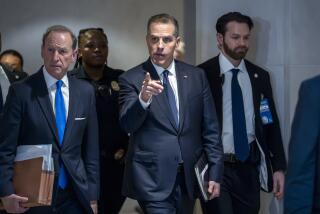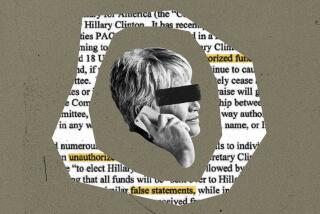Gore Mounts Defense of Fund-Raising
- Share via
WASHINGTON — After watching allegations over campaign fund-raising erode his popularity and jeopardize his political future, Vice President Al Gore and his closest advisors are mounting a behind-the-scenes campaign to defend him and to counter partisan pressure for the appointment of an independent counsel.
Through private calls to friends and sympathizers, Gore’s inner circle is trying to place favorable newspaper opinion pieces in Gore’s defense. Staff members are distributing “talking points” to Democratic members of Congress to use in their public comments about him. A more direct public response by Gore himself also is under consideration.
Meanwhile, Gore’s staff is refusing to provide any information about the myriad political events in recent years at the vice president’s official residence that might engender more fund-raising questions.
Gore’s response is beginning to resemble the crisis approach that is a staple of the Clinton presidency. Indeed, Gore aides said that the vice president is mulling the hiring of a special lawyer-spokesman to handle fallout from the fund-raising controversy.
“Basically the goal is to make sure the facts are out there and that people understand what the truth is,” said Marla Romash, Gore’s former Senate communications director. “The vice president acted appropriately and legally. What we’re seeing now is a partisan game--and it’s called ‘Get Gore.’ ”
The timing is particularly critical for Gore and his aspirations to succeed Clinton in 2000. Within the next 10 days, Atty. Gen. Janet Reno will decide whether to take a second formal step toward seeking an independent counsel’s investigation of Gore’s 70 calls to prospective donors in 1995 and 1996. Reno is conducting a similar preliminary review of whether Clinton made such calls.
An independent counsel inquiry, even one initiated with a narrow mandate, could well evolve into a sweeping investigation of the role of Clinton, Gore and others in the scramble to raise record-setting campaign sums. Gore hired two attorneys last week to represent him in the matter.
“We have a one-person audience here, and that’s Janet Reno,” acknowledged one Gore advisor.
The first thrust of the Gore outreach effort has been to disseminate his contention that the calls did not break the law. The key argument, reiterated on newspaper op-ed pages and TV talk shows, is that the 1883 law that prohibits soliciting contributions in government offices was intended to prevent officials from shaking down employees, not from seeking donations from outsiders, and has never been used to prosecute an official under such circumstances.
This week, Gore allies also publicly questioned the propriety of warnings by Republican lawmakers that they may attempt to impeach Reno unless she seeks appointment of an independent counsel.
“The one thing this is supposed to be is an independent process,” said a close Gore aide. “I can’t believe there’s been no outrage about that blatant partisan intimidation.”
At the same time, Gore’s staff must avoid any hint of interference with Reno’s decision, aides said. This is all the more delicate because Ronald A. Klain, Gore’s chief of staff, once served Reno in the same capacity and helped guide her through her Senate confirmation when she came to Washington.
The media-savvy Klain, a Harvard law graduate, is an architect of the Gore public relations counteroffensive. In addition, White House Special Counsel Lanny J. Davis, then a lawyer in private practice, also helped Reno with her 1993 confirmation hearings. Davis is the lead spokesman for Clinton on campaign finance issues.
Mike McCurry, Clinton’s press secretary, said: “Neither Lanny Davis nor Ron Klain are allowed by our counsel’s office to have any contact with the attorney general on this matter.”
Said Klain: “I have not spoken to the attorney general about this matter, nor would I.”
Gore himself has maintained a high profile through various public events, including a trip to Russia this week.
But past responses by Gore and his staff to the fund-raising controversy have prolonged questions and intensified criticism. This included Gore’s initial claim that a fund-raiser he attended at the Hsi Lai Buddhist temple in Hacienda Heights, Calif., last year was merely a “community outreach” event.
One recent hurdle for Gore has been explaining why he began making telephone calls to donors in November 1995--seven months after then-White House Counsel Abner J. Mikva issued a bluntly worded memo warning against such conduct.
Mikva addressed that nine-page memo to the White House Office of Policy Development and to the “Office of the Vice President Staff.” It said, in part:
“Campaign fund-raising activities of any kind are prohibited in or from government buildings. In addition, federal employees are prohibited from soliciting or accepting campaign contributions. This means that fund-raising events may not be held in the White House; also, no fund-raising phone calls or mail may emanate from the White House or any other federal building.”
Recently, at least one lawyer working on Gore’s behalf discussed with Mikva whether he would publicly clarify that his memo was not intended for the vice president.
In an interview, Mikva said his advice in the 1995 memo in fact did not apply to the president or vice president because they are constitutional officers. But he said he would not consider it appropriate to disclose any confidential advice he gave the president or vice president.
While Gore’s office has turned over thousands of pages of documents to Senate and House committees investigating the 1996 campaign, it has refused since January to provide The Times with information about events sponsored by Democratic political committees at the vice president’s residence.
In May 1996, Gore hosted a dinner for Democratic National Committee donors who gave at least $50,000 or who raised $100,000 for a fund-raising event that took in $12.3 million the following evening. In June 1995, top fund-raisers for the Clinton-Gore reelection committee also were hosted there.
Lorraine Voles, Gore’s communications director, said the vice president will not release a list of such events unless the White House does so.
Times researcher John W. Beckham in Chicago contributed to this story.
More to Read
Get the L.A. Times Politics newsletter
Deeply reported insights into legislation, politics and policy from Sacramento, Washington and beyond. In your inbox twice per week.
You may occasionally receive promotional content from the Los Angeles Times.











